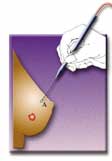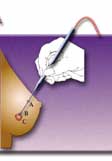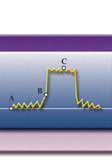 First clinical study of BioLuminate probe to detect breast cancer begins A revolutionary early breast cancer detection tool based on NASA technology is being tested in women with suspicious breast lesions at UC Davis Cancer Center to see if it can spare women with benign tumors from having to undergo a biopsy. The minimally invasive device, called the BioLuminate probe, takes real-time, detailed measurements of breast tissue using a fine needle with an "intelligent" tip. As soon as the needle is inserted into the breast, multiple sensors at the tip gather data on the optical and electrical properties of the breast tissue. Because benign and cancerous tissues scatter light and conduct electrical current differently, and have other detectable differences in their physical properties, this information can be used to immediately assess malignancy in suspicious breast lesions. "We hope this instrument will allow physicians to immediately diagnose cancerous tumors without surgery," said Lydia Howell, professor of pathology at UC Davis School of Medicine and Medical Center and principle investigator of the study. "Every week in the United States some 18,000 surgical breast biopsies are performed on women with suspicious breast lesions that later are determined to be benign. If we can reduce the number of biopsies that result in negative findings, we can significantly improve women's health." BioLuminate Inc., a Dublin, California-based start-up company licensed to develop and market the probe, is working with UC Davis physicians to conduct the studies. One hundred women who are scheduled for a surgical biopsy at UC Davis are being invited to participate in the pilot study. The initial data collected from the probe will be used to optimize the sensors and instrumentation to distinguish benign from malignant tissue. With the information gained from the pilot study, BioLuminate will develop the first commercial prototype, which will be tested in a larger clinical trial. In addition to Lydia Howell, other UC Davis physicians participating in this study include James Goodnight, Philip Schneider, Richard Bold and Vijay Khatri.
Home |
Table of Contents |
To our Readers |
Building on Basics UC Davis Health System | © 2000, 2001, 2002 UC Regents. All rights reserved. |
The BioLuminate probe uses multiple sensors to gather data on the optical and electrical properties of breast tissue.. |



